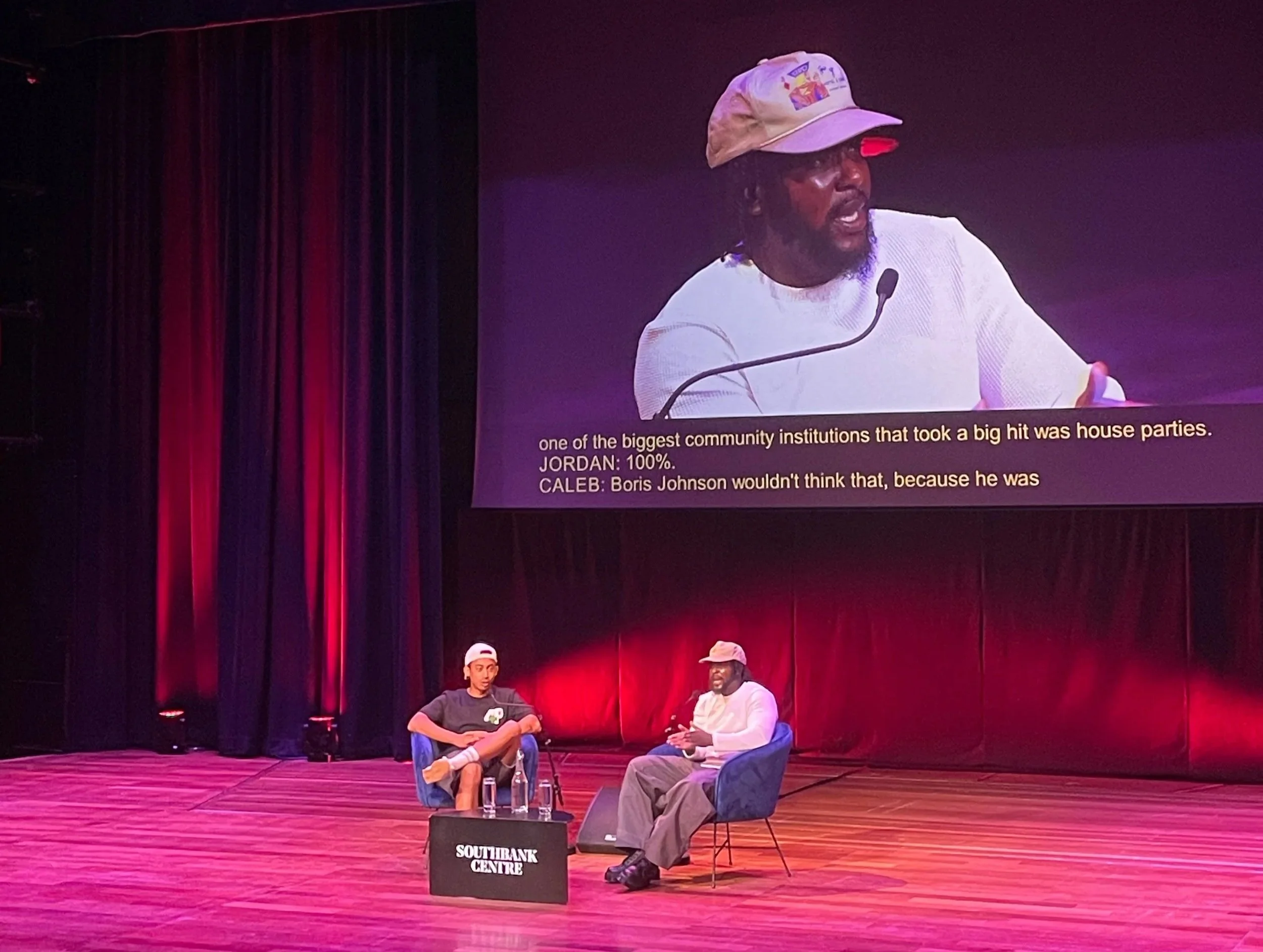Jordan Stephens and Caleb Femi on the Dancefloor
Words by Tanya Fevzi
On Friday night at the Southbank Centre’s Queen Elizabeth Hall, a crowd gathered to explore the social, cultural, and political significance of dancefloors. Taking the stage to discuss their personal impressions of the dancefloor over the course of their lives, its meaning and impact on their individual experiences were friends and bestselling authors Jordan Stephens and Caleb Femi.
Reflections on the life-affirming freedom of the party are often undermined and pushed out of political discussions, but brought to light this month in the midst of the Dance Your Way Home series at the Southbank Centre. Inspired by the stories and spirit of Emma Warren’s book of the same name, Dance Your Way Home is a celebration of the dancefloors that have brought people together. The multi-artform programme explores what happens when communities get moving, wherever the dancefloor may be, and Jordan and Caleb certainly explored the diverse possibilities of spaces that are transformed into dancefloors, from kitchens and bedrooms to rooftops and doorsteps.
Explorations and expressions of the dancefloor are familiar to Caleb’s work and writing. His latest publication, The Wickedest, is a poetry collection exploring the institution of shoobs (parties) through a minute-by-minute depiction of a night at a legendary house party. Caleb’s collection highlights the power and impact of parties beyond their surface-level hedonism, paying particular attention to their ability to transport us away from reality to a place where shoulders can soften, guards can lower, and a two-step is welcome. An introduction and short reading of his work after the Hall had settled paved a smooth stepping stone into the evening’s ensuing discussion…
… Which continued with a series of not-so-quick-fire questions probing who we really are at a party. What’s your favourite house party furniture? For Jordan, beanbags were the obvious answer, even after a traumatic beanbag incident involving a smoker and an erupting sea of polystyrene beads. Which room do you gravitate towards at a party? to which Caleb revealed himself to be a ‘Countertop Philosopher.’ Who are your unsung heroes at a party? And what’s the most told lie?
While the conversation wasn’t explicitly a political one, nor did it tackle concepts alien to the audience, the light shone on the power of the dancefloor for society and culture translates seamlessly across the political sphere in the UK and beyond. Dancing, in itself, embodies a form of body politics. Too often, going out to dance is perceived as just a frivolous act of recreational drug use and frenetic dancing, but this perception undermines the self-discovery, transformation, and connection that the dancefloor permits, and that is vital for us humans. Dancing can subvert and challenge societal and constitutional conventions, and it’s often marginalised people who make a place feel free and open, building a culture that breaks down barriers and brings people together.
One thing that stayed with me long after the event ended and the crowd dispersed was this feeling that the dancefloor has lost its place in today’s age. The ability to let loose at a party had been central to Jordan and Caleb’s discussion, and the memories of the dancefloor they shared largely evoked an out-of-body essence, where they transcended because all self-consciousness dissolved. Today’s tech makes it difficult to switch off in public spaces, and even the privacy of a home becomes public when it hosts a party. With constant surveillance and curated self-image, the pervasive fear of being recorded, coupled with a heightened desire to avoid public embarrassment means that less and less is the transcendent power of the dancefloor achieved. This decline will certainly impact how we connect and express ourselves, but reclaiming the dancefloor is resistance against the worlds’ demands of performance.
The dance floor certainly still exists, and there is hope for a wider reclamation, particularly in communities that need it most. Keeping memories of the dancefloor alive is a necessary part of passing on a legacy of movement and meaning. Jordan and Caleb were the perfect hosts for this talk, and they kept the tone of the evening playful and lighthearted, massively lacking that trying-to-sound-smart sort of inauthenticity that sometimes pervades discussions like these.
The event felt like a warm embrace. Swapping stories and relaying memories, but most importantly, asking questions and sparking interesting ideas and discourses. In a world where parties are increasingly documented, filtered, and posted, the raw, reckless joy of the dancefloor feels endangered. But conversations like this remind us of what’s worth preserving.
A big thank you to the Southbank Centre for spotlighting Jordan Stephens and Caleb Femi and for encouraging meaningful conversations.
